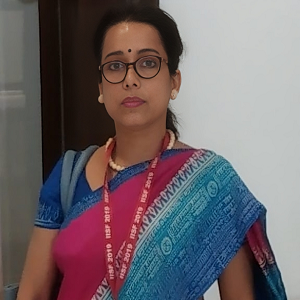Fostering a Culture of Sustainability through Comprehensive Awareness Initiatives
 Professor Mahuya Das is an accomplished academician and the Principal of Greater Kolkata College of Engineering and Management in Baruipur, South 24 Parganas, West Bengal. She holds a pivotal role in this engineering college under the flagship of JISGroup, the largest conglomerate of education in Eastern India. With a comprehensive experience spanning 20 years, including six years in the industry and 14 years in education administration, she brings a wealth of knowledge to her leadership position. Professor Das has an impressive track record with 27 research papers, showcasing her commitment to both academia and research. Her leadership and contributions make her a distinguished figure in the field of education.
Professor Mahuya Das is an accomplished academician and the Principal of Greater Kolkata College of Engineering and Management in Baruipur, South 24 Parganas, West Bengal. She holds a pivotal role in this engineering college under the flagship of JISGroup, the largest conglomerate of education in Eastern India. With a comprehensive experience spanning 20 years, including six years in the industry and 14 years in education administration, she brings a wealth of knowledge to her leadership position. Professor Das has an impressive track record with 27 research papers, showcasing her commitment to both academia and research. Her leadership and contributions make her a distinguished figure in the field of education.
Raising Awareness about Sustainable Practices
The initiation of sustainable practices in higher education begins with raising awareness among students. Sustainable education, as an integral part of this process, seeks to integrate values and motivations for acting sustainably into the lives of students. Several strategies can be employed to achieve this goal effectively. Educational programs, community events, curriculum integration, and public meetings are some of the avenues through which awareness can be disseminated. It is crucial to make sustainability easily understandable to the community, with a specific focus on engaging all stakeholders, including parents, students, and the broader community, in decision-making processes.
The importance of this awareness campaign lies in its potential to spread knowledge about sustainability challenges and solutions. By implementing effective outreach activities, higher education institutions can contribute to building a culture of sustainability among students. Educational programs can be designed to incorporate sustainability principles into various disciplines, ensuring that students understand the Interconnection of environmental, social, and economic issues. Community events and public meetings provide platforms for dialogue, fostering a sense of collective responsibility towards sustainable practices.
Challenges and Addressing Strategies
However, promoting sustainability in higher education is not without challenges. These challenges often revolve around issues of instability, implementation, and governance. Effective leadership is crucial in navigating these challenges, requiring individuals who can guide institutions toward sustainable practices with a clear vision. Coordinated partnerships with various stakeholders, including government bodies, industry leaders, and local communities, are essential for pooling resources and expertise.
Investment, both financial and intellectual, is another challenge that needs to be addressed. Institutions need to allocate resources for sustainability initiatives, ensuring that there is sufficient support for research, programs, and infrastructure development. Moreover, the need for a more inclusive, equitable, and holistic approach is emphasized. This involves addressing issues such as poverty, human rights, and inequality in tandem with efforts towards sustainability. To overcome these, System thinking and critical thinking are essential for addressing problems holistically and promoting innovative solutions. Participation and partnership, both within and outside the educational institution, are vital for ensuring the success of sustainability programs.
Advocating for Sustainability
Advocating for sustainability within higher education institutions necessitates a multidisciplinary approach to curriculum development. This approach focuses on fostering the development of intellectual, cognitive, creative, and social skills within the institution. The curriculum should encourage students to explore a range of subjects, promoting cross-disciplinary learning and understanding.
Emphasis is placed on skill education, as this equips students with the practical abilities required for the job market. Integrating technology into education, offering innovative teaching methods, and creating virtual labs contribute to a more dynamic and responsive educational experience. Academic flexibility allows students to choose subjects across different streams, promoting a well-rounded education that aligns with their interests and career goals.
Globalisation of education is another key aspect of advocating for sustainability. Collaborations with foreign institutions and exposure to global platforms provide students with diverse perspectives and opportunities for learning and research. Redefining institutional missions and goals, establishing priorities, and fostering a strong research culture are crucial strategies for aligning educational institutions with sustainable development.
Role of Research in Advancing Sustainability
Research plays a pivotal role in advancing sustainability goals within higher education institutions. It is through research that a deeper understanding of environmental, economic, and social concepts related to the challenges towards achievement of sustainability is surfaced. Interdisciplinary research is encouraged, as it allows institutions to contribute to the development of sustainable solutions that address complex issues.
Research informs decision-making processes by providing evidence-based recommendations for policies and practices. It helps in identifying areas of need and opportunities for innovation and improvement. Critical thinking and innovation fostered through research, contribute to the development of technology and policies that align with sustainability goals.
Key Performance Indicators for Evaluating Success
The assessment of sustainability programs in higher education relies on Key Performance Indicators (KPIs) that delve into students' attributes. These KPIs encompass knowledge, skills, attitudes, and values acquired during their academic journey. Emphasizing transferable competencies, KPIs aim to measure skills extending beyond specific subjects, fostering adaptability and critical thinking. The focus on holistic development accentuates the need for flexible, cross-disciplinary learning, ensuring a comprehensive educational experience. KPIs also gauge graduates' success as responsible citizens, blending technical expertise with a global perspective. Evaluating the impact initiatives towards sustainability Includes assessing students' capability to broaden their knowledge base, acquire new skills, and excel in their chosen fields. This comprehensive evaluation is pivotal in determining the overall success and effectiveness of sustainability programs within higher education institutions.

